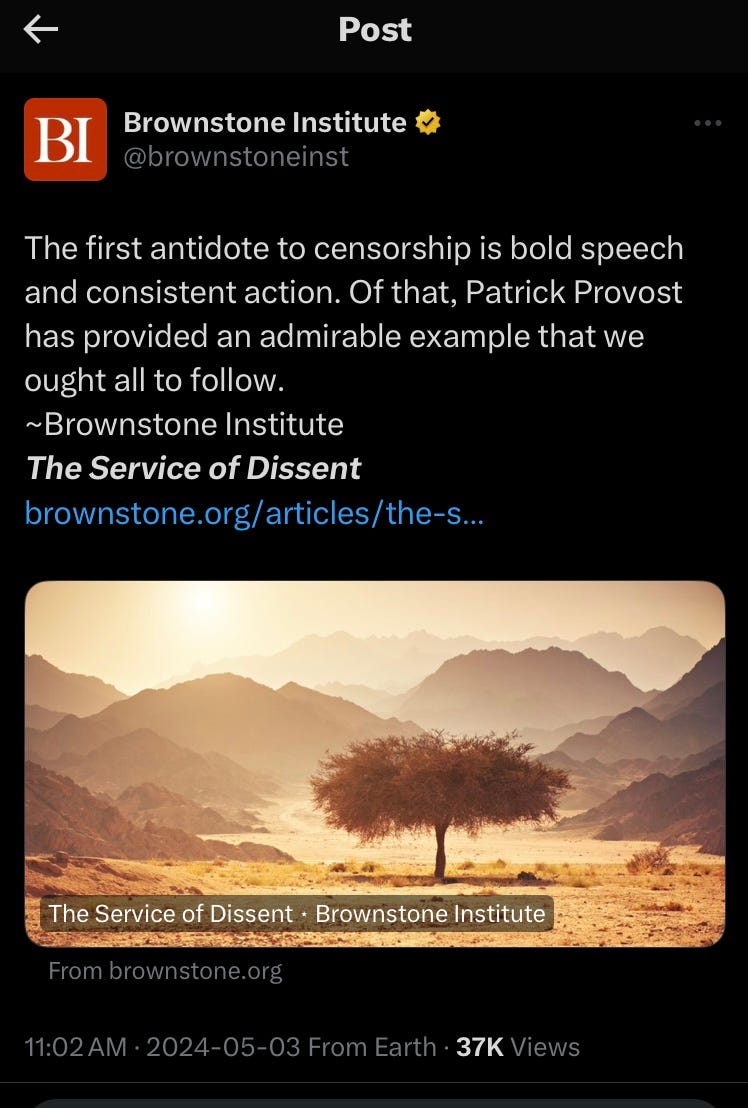This week’s post will be perfunctory, with many apologies. It coincides with my final preparations for an extended return to the Prairies—by way of a 5-day tour through the northern Midwest (which suits this road trip-loving cat just fine).
Move or no move, though—resistance-wise, the past few weeks have seen some noteworthy and, hopefully, consequential developments. One was the announcement that X will support a lawsuit brought by Dr. Matt Strauss against his former employer, Queen’s University. Dr. Strauss is arguing that Queen’s forced him to resign in 2021 as a retaliation for his public critiques of COVID measures.
This is the X News post:
After Dr. Strauss argued against wide COVID lockdowns and mandates on his X account, @strauss_matt, Queen's University (@queensu) publicly ostracized him, retaliated against him, and ultimately forced him to resign because his opinions did not conform to the university's political orthodoxy.
@X supports Dr. Strauss's efforts to vindicate his free speech rights without fear of unfair retaliation!
Dr. Strauss, a critical care doctor and now Conservative Party candidate for the riding of Kitchener South—Hespeler, is one of those good doctors honoured in a prior post in this series.
The second development also took place on May 3. The Brownstone Institute published a letter by a handful of Canadian university professors in support of their dismissed colleague, Patrick Provost. A biochemist with expertise in core components of the COVID shots, Professor Provost had been fired from his Quebec university, Université Laval, on March 28.
The university did not comment on the grounds of his dismissal. Professor Provost did, however. His public letter appears in English translation in a Substack post by McGill theologian Douglas Farrow.
Professor Provost’s letter states:
This decision follows a series of warnings and disciplinary sanctions which, at source, concern a single, sensitive, even explosive issue: my public and internal criticism of Covid-19 mRNA ‘vaccines.’ . . .
Being aware of the potential risks, known and unknown, associated with these new “vaccines,” I could not remain silent on such important issues, where lives were at stake, particularly those of children. So I decided to go public with my deep and legitimate concerns, which have evolved over time and are based on recognised concepts, solid scientific evidence and reasoning. The main purpose of my statements was to inform and alert the public, my colleagues, my superiors, government experts, doctors and those elected to represent us in the Quebec National Assembly.
His nine defenders came from various universities across Canada. Their letter applauds Professor Provost for speaking out—and reminds that words said and deeds done by brave individuals are decisive in resisting censorship:
In the last four years we have seen an astonishing rise in censorship, as in other forms of bullying and coercion, inside and outside the academy, even from governments and state agencies. We can’t reverse that by regret. We can only reverse it by acts of resistance. The first antidote to censorship is bold speech and consistent action. Of that, Patrick Provost has provided an admirable example that we ought all to follow.
The letter also questions the fate of a democracy wherever academic freedom is undermined. Without academic freedom, it argues, a society cannot have confidence that higher education
has not altogether lapsed from the pursuit of truth into an exercise in right-think; that it has not shamelessly prostituted itself to the powers that be, to the point that even tenure means nothing.
Academic freedom, which tenure supports, is the last line of defence against such prostitution. It lies in everyone’s best interests. Without it, democracy itself cannot flourish; arguably, it cannot even survive. For if we give place to censorship in the university, we give place to censorship virtually everywhere else.
The letter is well worth reading in full—as is Douglas Farrow’s article offering further context and reflection. Also worth reading in full is the testimony of Professor Provost before the National Citizen’s Inquiry in May 2023, describing both his message and his long battle with the university. (Although he testified in French, an English translation appears in the NCI’s official transcripts.)
Meanwhile, a May 8 article published by Children’s Health Defense bears the following headline: “University Nabs $42 Million for ‘Pandemic Preparedness’ 2 Weeks After Firing Scientist for Questioning COVID Shots for Kids.” The funds came from the federally-funded Canada Foundation for Innovation. Inevitably, the timing of the award begs questions about conditions that may have been attached. Happily, the article also reports that both Professor Provost’s union and the Quebec Federation of University Professors are supporting him.
So far, though, only those nine professors have come forward of the many thousands of academics in the country. This is a harsh reality. It begs questions that have nagged since the COVID debacle began.
Namely: why the quiescence of the professionals? Could they really all be fired if there were thousands of Patrick Provosts among them? If not on principle, then surely in a broad sense of long-term self-interest, would Canadians academics not wish to come out en masse to defend tenure—that prize of decades of personal striving and a primary benefit of their university employment?
A second set of questions involves jurisdiction. Specifically: will provincial governments continue to tolerate the federal government’s steering of research in their jurisdictions? Will any provincial government take up protection of academic freedom as part of defending its own constitutional powers?
Related to this: which Canadian university will step up to fill what may well emerge as a “niche market” among students and parents if the suppression of academic freedom continues? Which post-secondary institution will consciously buck the trend, making it a selling point to preserve the centuries-old tradition of robust academic freedom within its walls?
Finally, importantly: What can we lay people and citizens do to promote such a development? It is crucial to support Professor Provost and the few others like him—and also to thank and encourage those nine academics who threw their weight behind him. Just as crucial will be to ensure funding and protection of scientific research that serves the public, rather than private or state interests of whatever level. How best to do it?
Readers’ thoughts are invited in the comments below.
See you all on the other side.
Further Reading
Brownstone Institute, “The Service of Dissent.” May 3, 2024.
Shannon Dea. “A brief history of academic freedom.” University Affairs, Oct 9, 2018.
Jean-Michael Dumais. “University Nabs $42 Million for ‘Pandemic Preparedness’ 2 Weeks After Firing Scientist for Questioning COVID Shots for Kids.” The Defender, May 8, 2024.
Douglas Farrow, “Dissent Equals Inequity: Laval fires a full professor for disseminating inconvenient information.” Desiring a Better Country, April 27, 2024.
National Citizen’s Inquiry. “Evidence: Witness 12, Dr. Patrick Provost” (the transcript is translated from the original French), Quebec City hearings, May 13, 2023.






Those are good yet tough questions, Jodi: How do everyday folks support academic freedom? And how do we support research that serves public interests?
Recently Anna told me about the Whistle Stop Cafe podcast with Chris and Kerry. Chris Scott, the Alberta cafe owner, is known for taking a stand against COVID measures and mandates, for which he was heavily fined and eventually jailed. This week the podcast featured Dr. Byram Bridle from the University of Guelph, speaking about his experience as a virologist, immunologist, and vaccinologist.
Dr. Bridle has been censored by the mainstream media and hounded with ad hominem attacks because of his critical comments on mRNA vaccines as far back as the spring of 2021. He’s called for and been willing to participate in open public debates with public health officials, but so far no one has taken him up. He’s also been banished from teaching at the university where he used to run a research lab and now teaches from the basement of his home.
When Dr. Bridle speaks, he is at pains to help the public understand the science of virology and vaccinology; he clearly understands that his role as a university researcher is to serve the public. And now the public in pursuit of the truth is serving him: here we have a couple of guys with a podcast giving him a platform to disseminate his knowledge and answer questions from the public. Would this have happened before the COVID era? I don’t know, but you gotta love this example of how ordinary folk take up the challenge and create spaces to ensure academic folk also committed to pursuing the truth are still heard.